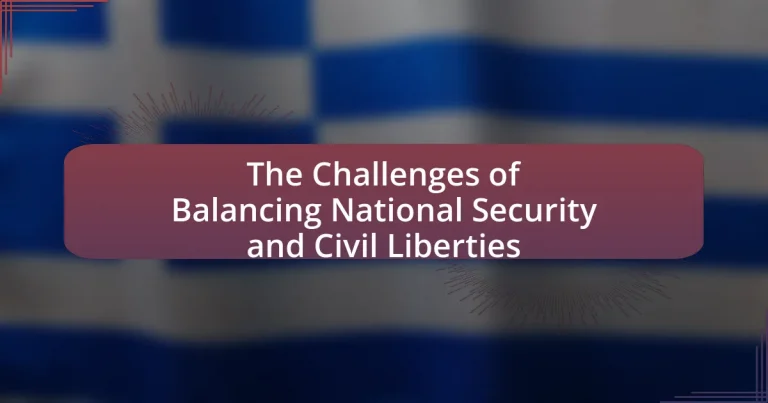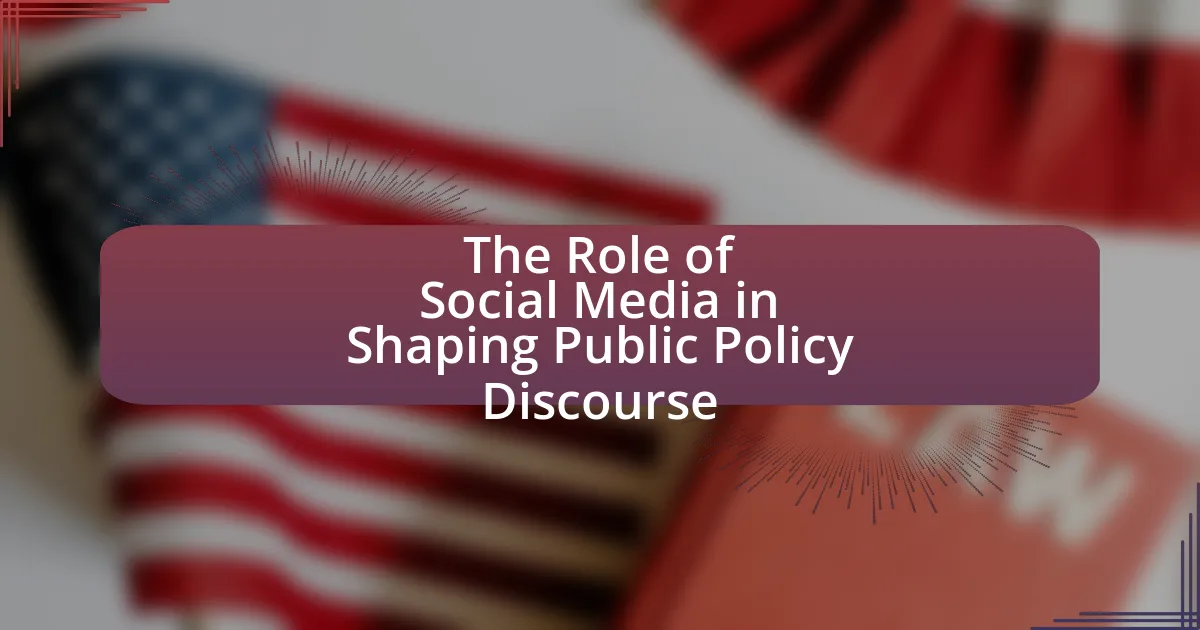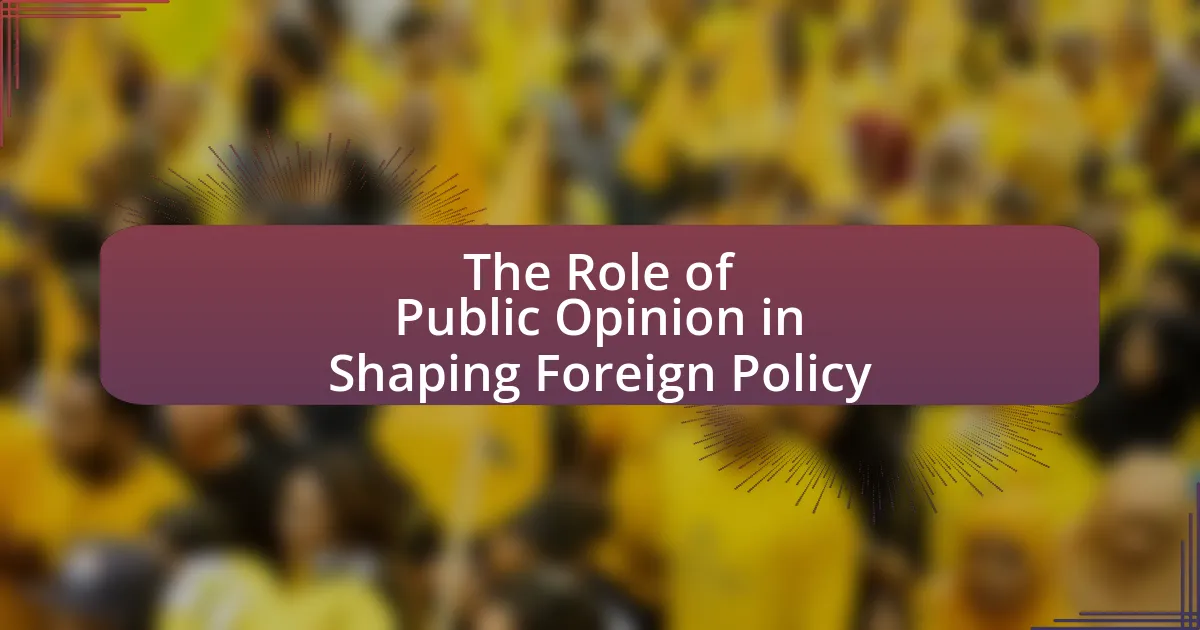The article examines the challenges of balancing national security and civil liberties, highlighting key issues such as government overreach, erosion of privacy rights, and the complexities of establishing legal frameworks. It discusses how national security measures can restrict civil liberties, particularly the right to privacy, freedom of speech, and due process, often justified by heightened security concerns. Historical examples, including the internment of Japanese Americans and the implications of the USA PATRIOT Act, illustrate the consequences of prioritizing security over individual rights. The article also addresses public perceptions of the trade-offs between security and liberty, the role of technology in surveillance, and the importance of transparency and public engagement in policymaking to maintain trust while ensuring safety.
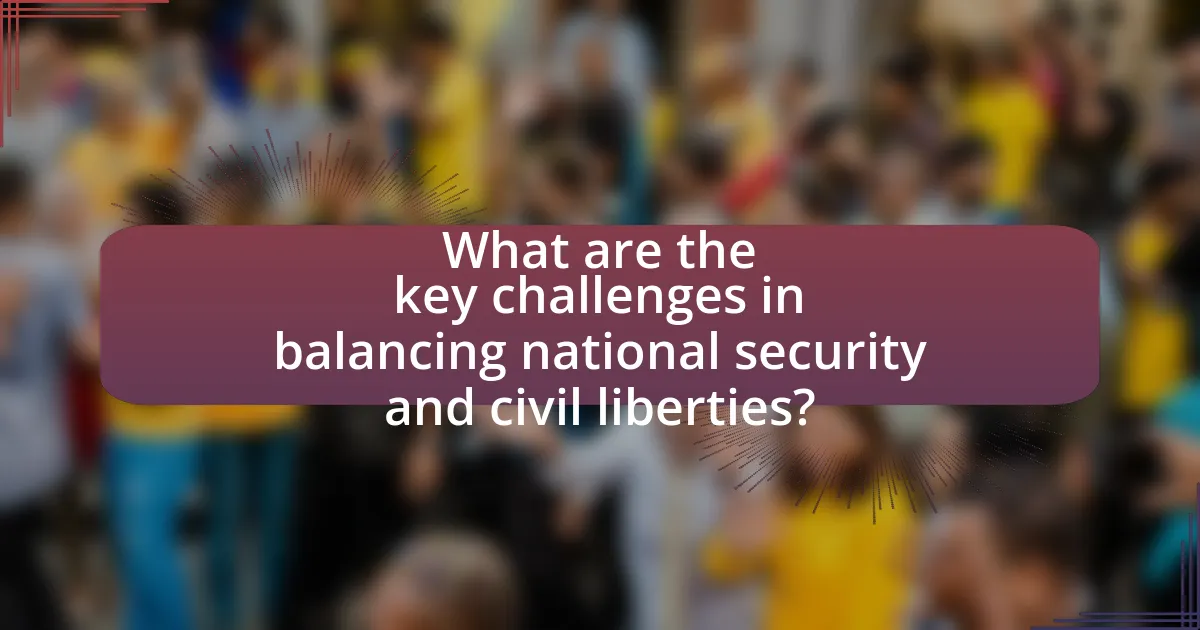
What are the key challenges in balancing national security and civil liberties?
The key challenges in balancing national security and civil liberties include the potential for government overreach, the erosion of privacy rights, and the difficulty in establishing clear legal frameworks. Government overreach can occur when security measures infringe upon individual freedoms, as seen in cases like the USA PATRIOT Act, which expanded surveillance capabilities at the expense of civil liberties. The erosion of privacy rights is evidenced by increased data collection and monitoring practices, raising concerns about the extent to which citizens are surveilled without due process. Additionally, establishing clear legal frameworks is challenging due to the rapid evolution of technology and the need for laws to adapt to new security threats while protecting civil rights, as highlighted by ongoing debates surrounding encryption and data protection laws.
How do national security measures impact civil liberties?
National security measures often restrict civil liberties by implementing surveillance, limiting freedom of speech, and enabling detention without trial. For instance, the USA PATRIOT Act, enacted after the September 11 attacks, expanded government surveillance capabilities, which critics argue infringed on privacy rights. Additionally, during times of heightened security concerns, such as the War on Terror, governments may justify curtailing civil liberties in the name of public safety, leading to practices like racial profiling and increased police powers. Historical examples, such as the internment of Japanese Americans during World War II, illustrate how national security can override individual rights, demonstrating a recurring tension between ensuring safety and protecting civil liberties.
What specific civil liberties are most affected by national security policies?
The specific civil liberties most affected by national security policies include the right to privacy, freedom of speech, and the right to due process. National security measures often involve surveillance programs that infringe on individuals’ privacy rights, as seen in the revelations about the National Security Agency’s data collection practices. Additionally, laws enacted in the name of national security can lead to restrictions on free speech, particularly regarding dissent or criticism of government actions, as evidenced by the use of the Espionage Act against whistleblowers. Furthermore, national security policies can undermine due process rights, particularly for individuals detained under terrorism-related charges, where legal protections may be circumvented, as highlighted by cases involving indefinite detention without trial.
How do citizens perceive the trade-offs between security and liberty?
Citizens often perceive the trade-offs between security and liberty as a complex balancing act, where increased security measures can lead to perceived infringements on personal freedoms. Surveys indicate that a significant portion of the population supports enhanced security protocols, especially in the wake of terrorist threats, but many also express concern over government overreach and the erosion of civil liberties. For instance, a 2019 Pew Research Center study found that 62% of Americans believe that the government should prioritize security over personal privacy, yet 54% also feel that the government has gone too far in restricting civil liberties in the name of security. This duality reflects a nuanced understanding among citizens that while security is essential, it should not come at the expense of fundamental rights.
Why is it important to maintain a balance between national security and civil liberties?
Maintaining a balance between national security and civil liberties is crucial to protect individual freedoms while ensuring the safety of the state. When national security measures infringe upon civil liberties, it can lead to government overreach, loss of personal freedoms, and erosion of democratic principles. Historical examples, such as the internment of Japanese Americans during World War II, illustrate how security concerns can lead to significant violations of civil rights. Furthermore, the USA PATRIOT Act, enacted after the September 11 attacks, raised concerns about surveillance and privacy, highlighting the ongoing tension between security and individual rights. Balancing these interests is essential to uphold the rule of law and maintain public trust in government institutions.
What historical examples illustrate the consequences of neglecting civil liberties for security?
The internment of Japanese Americans during World War II illustrates the consequences of neglecting civil liberties for security. In 1942, the U.S. government forcibly relocated and incarcerated around 120,000 Japanese Americans, two-thirds of whom were U.S. citizens, citing national security concerns after the attack on Pearl Harbor. This action was later recognized as a violation of civil rights, leading to significant psychological and economic harm to the affected individuals and communities. The U.S. government formally apologized in 1988 and provided reparations, acknowledging that the internment was based on racial prejudice rather than any legitimate security threat. Another example is the USA PATRIOT Act, enacted after the September 11 attacks, which expanded government surveillance capabilities at the expense of privacy rights. Critics argue that this legislation has led to abuses of power and erosion of civil liberties, as evidenced by the revelations from whistleblower Edward Snowden in 2013, which exposed widespread surveillance practices that violated citizens’ rights without due process.
How does the balance affect public trust in government institutions?
The balance between national security and civil liberties significantly affects public trust in government institutions. When citizens perceive that their civil liberties are being compromised for the sake of security, trust in government diminishes, as evidenced by surveys indicating that over 60% of Americans believe that government surveillance programs infringe on their privacy rights. Conversely, when governments effectively communicate the necessity of security measures while respecting civil liberties, public trust can be strengthened, as seen in countries that have successfully implemented transparent policies. This relationship underscores the importance of maintaining a careful equilibrium to foster confidence in governmental authority.
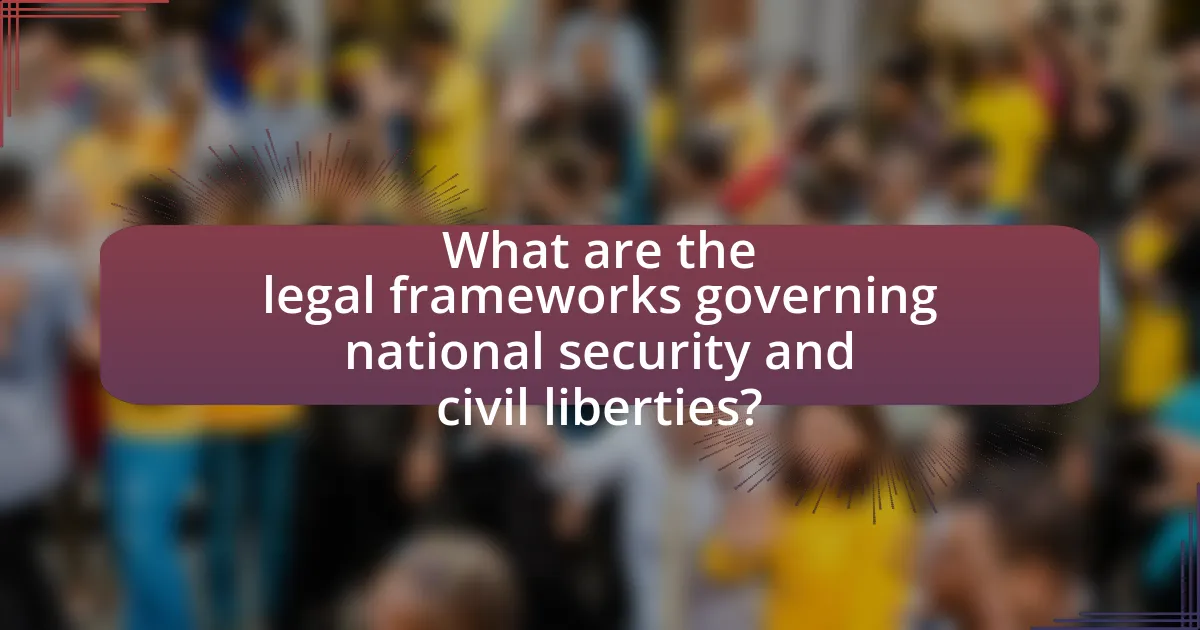
What are the legal frameworks governing national security and civil liberties?
The legal frameworks governing national security and civil liberties primarily include constitutional provisions, statutory laws, and international treaties. In the United States, the Constitution, particularly the Bill of Rights, establishes civil liberties, while laws such as the USA PATRIOT Act and the Foreign Intelligence Surveillance Act (FISA) outline national security measures. These frameworks aim to protect individual rights while allowing the government to ensure national security. For instance, the Fourth Amendment protects against unreasonable searches and seizures, yet FISA permits surveillance under specific conditions to safeguard national interests. This balance is further influenced by judicial interpretations, such as those from the Supreme Court, which shape the application of these laws in practice.
How do constitutional rights protect civil liberties in the context of national security?
Constitutional rights protect civil liberties in the context of national security by establishing legal frameworks that limit government power and safeguard individual freedoms. For instance, the First Amendment guarantees freedom of speech and assembly, which ensures that citizens can express dissent against government actions, including those taken in the name of national security. Additionally, the Fourth Amendment protects against unreasonable searches and seizures, requiring law enforcement to obtain warrants based on probable cause, thereby preventing arbitrary government intrusion into personal privacy. Historical cases, such as the Supreme Court’s decision in Katz v. United States (1967), affirm that constitutional protections remain in effect even during national security concerns, reinforcing the principle that civil liberties cannot be suspended without due process.
What amendments are most relevant to the discussion of civil liberties?
The amendments most relevant to the discussion of civil liberties are the First, Fourth, Fifth, and Fourteenth Amendments. The First Amendment protects freedoms concerning religion, expression, assembly, and the right to petition, which are foundational to individual liberties. The Fourth Amendment safeguards against unreasonable searches and seizures, ensuring privacy rights. The Fifth Amendment guarantees due process and protects against self-incrimination, while the Fourteenth Amendment extends these protections at the state level, affirming equal protection under the law. These amendments collectively form the core legal framework that defines and protects civil liberties in the United States.
How have court rulings shaped the balance between security and liberty?
Court rulings have significantly influenced the balance between security and liberty by establishing legal precedents that define the limits of government power in the name of national security. For instance, the Supreme Court case of Korematsu v. United States (1944) upheld the internment of Japanese Americans during World War II, prioritizing national security over individual liberties, which has since been criticized as a violation of civil rights. Conversely, in cases like United States v. United States District Court (1972), the Court ruled that the government could not conduct warrantless wiretaps for national security purposes, reinforcing the protection of civil liberties. These rulings illustrate the ongoing tension and negotiation between ensuring national security and safeguarding individual freedoms, shaping the legal landscape in which these issues are addressed.
What role do international laws and treaties play in this balance?
International laws and treaties play a crucial role in balancing national security and civil liberties by establishing frameworks that govern state behavior and protect individual rights. These legal instruments, such as the International Covenant on Civil and Political Rights, set standards that countries must adhere to, ensuring that measures taken for national security do not infringe upon fundamental freedoms. For instance, the European Convention on Human Rights has been instrumental in guiding member states to respect civil liberties even in the context of security threats, as seen in cases where courts have ruled against excessive surveillance practices. Thus, international laws and treaties provide a necessary check on governmental power, promoting accountability and safeguarding civil liberties while addressing security concerns.
Which international agreements address the protection of civil liberties?
International agreements that address the protection of civil liberties include the International Covenant on Civil and Political Rights (ICCPR) and the European Convention on Human Rights (ECHR). The ICCPR, adopted by the United Nations in 1966, establishes fundamental rights such as the right to life, freedom of speech, and the right to a fair trial, which are essential for civil liberties. The ECHR, established in 1953, similarly safeguards individual rights and freedoms within its member states, emphasizing the importance of civil liberties in the context of national security. Both agreements serve as legal frameworks that obligate signatory countries to uphold and protect civil liberties, thereby reinforcing their commitment to human rights.
How do different countries approach the balance between national security and civil liberties?
Different countries approach the balance between national security and civil liberties through varying legal frameworks and policies. For instance, the United States emphasizes civil liberties through the Bill of Rights, yet has enacted laws like the USA PATRIOT Act, which expands surveillance capabilities in the name of national security. In contrast, countries like the United Kingdom implement extensive surveillance measures under the Investigatory Powers Act, prioritizing security while facing criticism for potential civil liberties infringements. Additionally, nations such as Germany maintain a strong commitment to civil liberties, influenced by historical context, leading to strict regulations on data privacy and surveillance. These approaches reflect each country’s unique legal, cultural, and historical contexts, demonstrating the complex interplay between ensuring security and protecting individual rights.
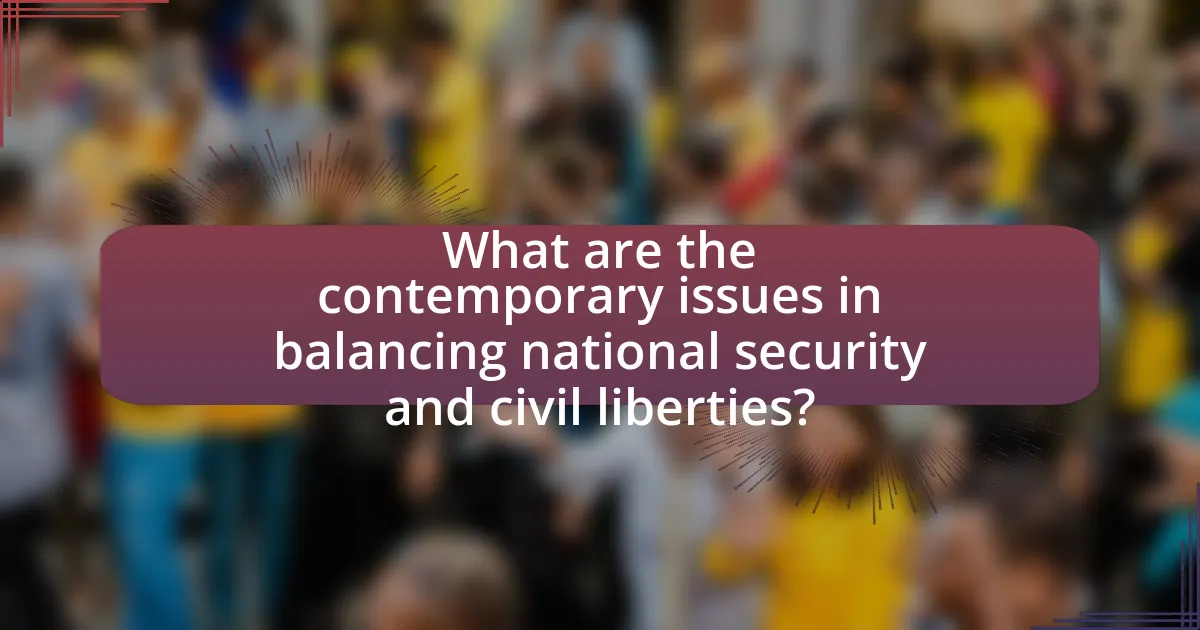
What are the contemporary issues in balancing national security and civil liberties?
Contemporary issues in balancing national security and civil liberties include government surveillance, data privacy, and the potential for racial profiling. Government surveillance programs, such as those revealed by Edward Snowden in 2013, have raised concerns about the extent to which personal privacy is compromised in the name of security. The USA PATRIOT Act, enacted after the September 11 attacks, expanded surveillance capabilities but also sparked debates about civil liberties and the right to privacy. Additionally, racial profiling practices in security measures can lead to discrimination and violate civil rights, as seen in various law enforcement policies that disproportionately target minority communities. These issues highlight the ongoing tension between ensuring national security and protecting individual freedoms.
How has technology influenced the balance between security and civil liberties?
Technology has significantly influenced the balance between security and civil liberties by enabling enhanced surveillance capabilities and data collection methods that often infringe on individual privacy rights. For instance, the widespread use of surveillance cameras, facial recognition software, and data mining techniques allows governments to monitor citizens more closely, which can lead to a reduction in civil liberties as individuals may feel constantly watched. According to a 2020 report by the Electronic Frontier Foundation, the use of such technologies has increased post-9/11, with many countries implementing laws that expand surveillance powers under the guise of national security. This shift illustrates a trend where security measures often prioritize state interests over personal freedoms, raising concerns about the erosion of civil liberties in the digital age.
What are the implications of surveillance technologies on civil liberties?
Surveillance technologies significantly impact civil liberties by infringing on privacy rights and enabling government overreach. The widespread use of tools such as facial recognition and data collection systems can lead to a chilling effect on free speech and assembly, as individuals may self-censor due to fear of being monitored. Studies, such as the 2018 report by the Electronic Frontier Foundation, highlight that increased surveillance correlates with a decline in public trust and participation in democratic processes. Furthermore, legal frameworks often lag behind technological advancements, resulting in inadequate protections for citizens against unwarranted surveillance, as seen in cases like the USA PATRIOT Act, which expanded government surveillance capabilities post-9/11.
How do social media and digital communication affect national security policies?
Social media and digital communication significantly influence national security policies by enabling rapid information dissemination and facilitating the mobilization of public opinion. These platforms allow for the swift spread of both accurate and misleading information, which can shape perceptions of threats and influence governmental responses. For instance, during the Arab Spring, social media played a crucial role in organizing protests and challenging authoritarian regimes, prompting governments to reassess their security strategies in response to public dissent. Additionally, the rise of online radicalization has led national security agencies to adapt their policies to monitor and counteract extremist narratives proliferating on these platforms. The integration of social media analytics into intelligence operations further exemplifies how digital communication reshapes national security frameworks, as agencies leverage data to anticipate and mitigate potential threats.
What are the public’s concerns regarding government overreach in the name of security?
The public’s concerns regarding government overreach in the name of security primarily revolve around the erosion of civil liberties and privacy rights. Citizens fear that increased surveillance, such as mass data collection and monitoring, infringes on their personal freedoms and autonomy. For instance, the USA PATRIOT Act, enacted after the September 11 attacks, expanded government surveillance capabilities, leading to widespread criticism about its impact on individual rights. Additionally, there is apprehension that such overreach can lead to discrimination and profiling, particularly against marginalized communities, as seen in various reports highlighting racial and ethnic profiling in counter-terrorism efforts. These concerns are underscored by a growing public demand for transparency and accountability in government actions related to national security.
How do recent events shape public opinion on national security measures?
Recent events significantly influence public opinion on national security measures by heightening awareness and concern regarding threats. For instance, incidents such as terrorist attacks or cyber breaches often lead to increased support for stronger security protocols, as seen after the September 11 attacks in 2001, which resulted in the implementation of the USA PATRIOT Act and a surge in public backing for enhanced surveillance. Additionally, ongoing geopolitical tensions and domestic violence incidents can shift perceptions, prompting citizens to prioritize safety over civil liberties, as evidenced by surveys indicating that a majority of Americans favored increased security measures following high-profile attacks. This dynamic illustrates how immediate threats can lead to a collective call for more robust national security policies, often at the expense of civil liberties.
What movements advocate for the protection of civil liberties?
Movements that advocate for the protection of civil liberties include the American Civil Liberties Union (ACLU), Human Rights Watch, and the Electronic Frontier Foundation (EFF). The ACLU has been instrumental in legal battles to uphold individual rights, such as free speech and privacy, often citing landmark cases like Brown v. Board of Education to demonstrate the importance of civil liberties in a democratic society. Human Rights Watch focuses on global human rights issues, documenting abuses and advocating for policy changes to protect civil liberties worldwide. The EFF specifically addresses digital rights, fighting against government surveillance and advocating for privacy protections in the digital age, supported by evidence of increasing data breaches and privacy violations.
What best practices can be implemented to ensure a fair balance?
To ensure a fair balance between national security and civil liberties, implementing transparent oversight mechanisms is essential. These mechanisms can include independent review boards that assess government actions related to surveillance and security measures, ensuring accountability and adherence to legal standards. For instance, the Privacy and Civil Liberties Oversight Board (PCLOB) in the United States provides oversight of counterterrorism programs, highlighting the importance of independent evaluations in maintaining civil liberties while addressing security concerns. Additionally, public engagement through consultations and feedback can foster trust and ensure that policies reflect societal values, further reinforcing the balance between security and individual rights.
How can policymakers engage the public in discussions about security and liberty?
Policymakers can engage the public in discussions about security and liberty by facilitating open forums and town hall meetings that encourage dialogue. These platforms allow citizens to voice their concerns and ask questions, fostering a two-way communication channel. Research indicates that public participation in policymaking enhances trust and transparency, as seen in the 2016 National Dialogue on the Future of Privacy and Civil Liberties, which involved diverse stakeholders and resulted in actionable recommendations. By actively involving the community in these discussions, policymakers can better understand public sentiment and create policies that reflect the values of both security and civil liberties.
What role does transparency play in maintaining trust while ensuring security?
Transparency is essential in maintaining trust while ensuring security, as it fosters accountability and openness in governmental actions. When authorities communicate their security measures and policies clearly, citizens are more likely to feel informed and engaged, which enhances their trust in these institutions. For instance, studies have shown that transparency in law enforcement practices, such as the release of data on surveillance activities, can lead to increased public confidence and cooperation. Furthermore, transparency helps to mitigate fears of abuse of power, as it allows for public scrutiny and oversight, thereby reinforcing the legitimacy of security measures.
